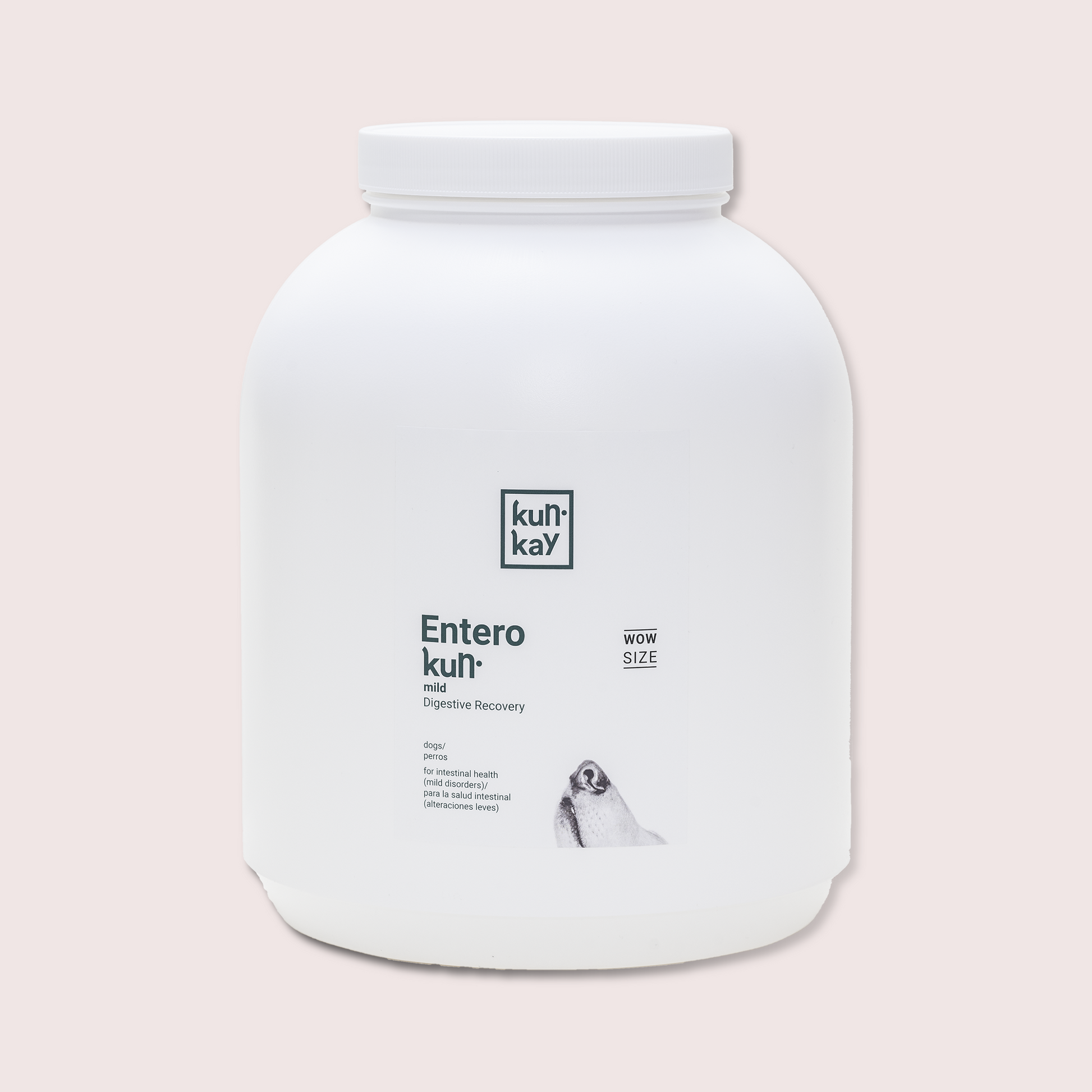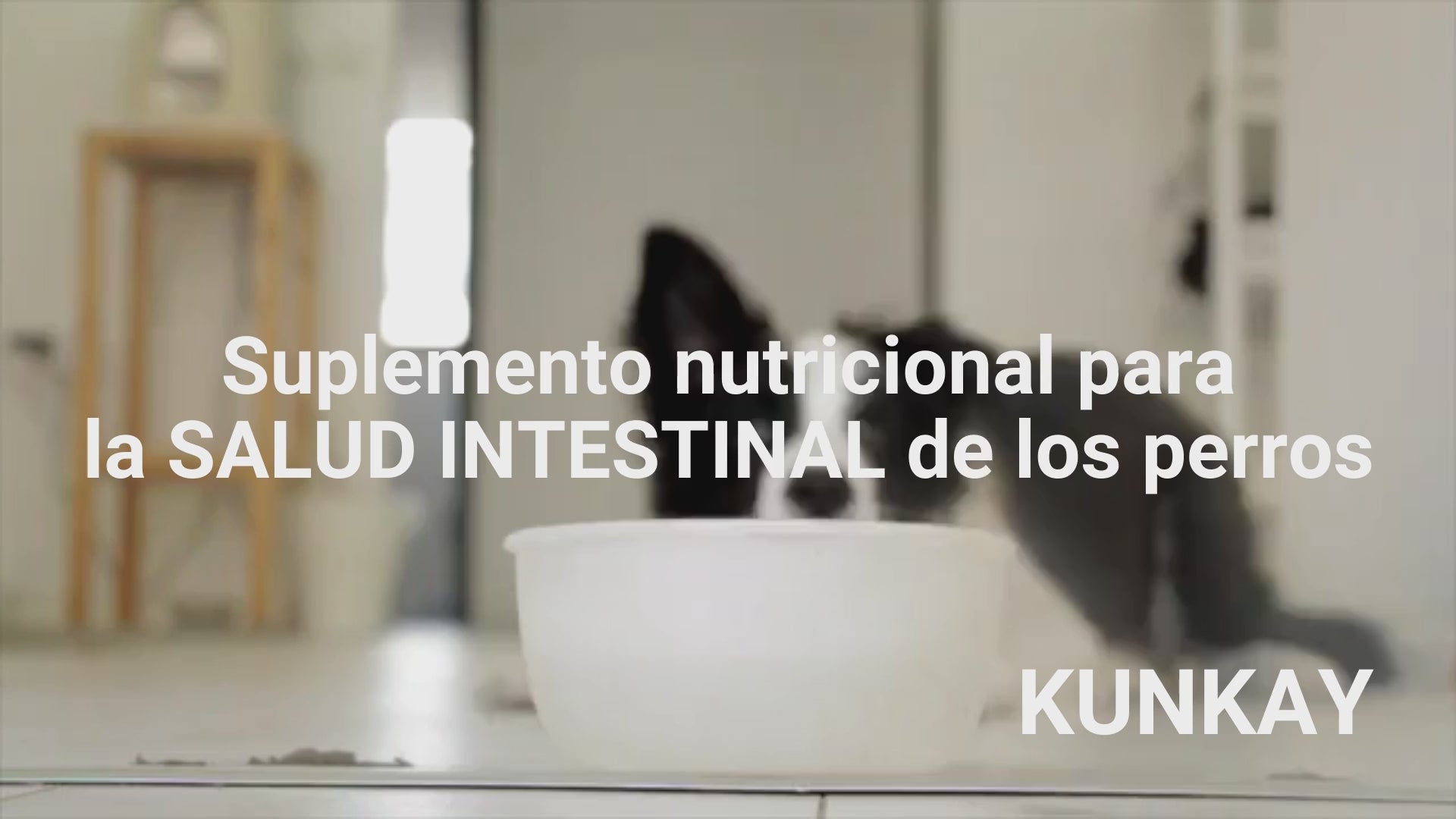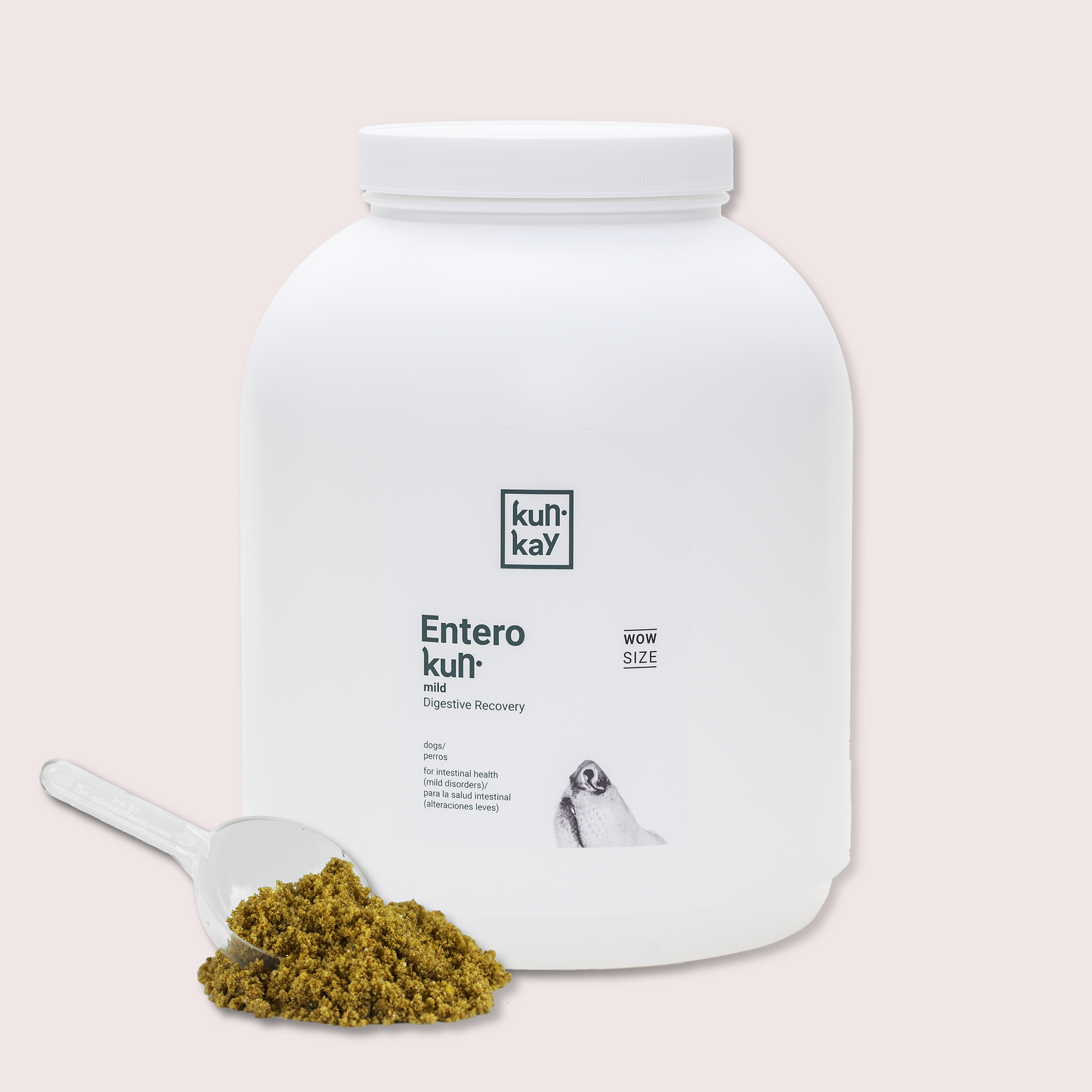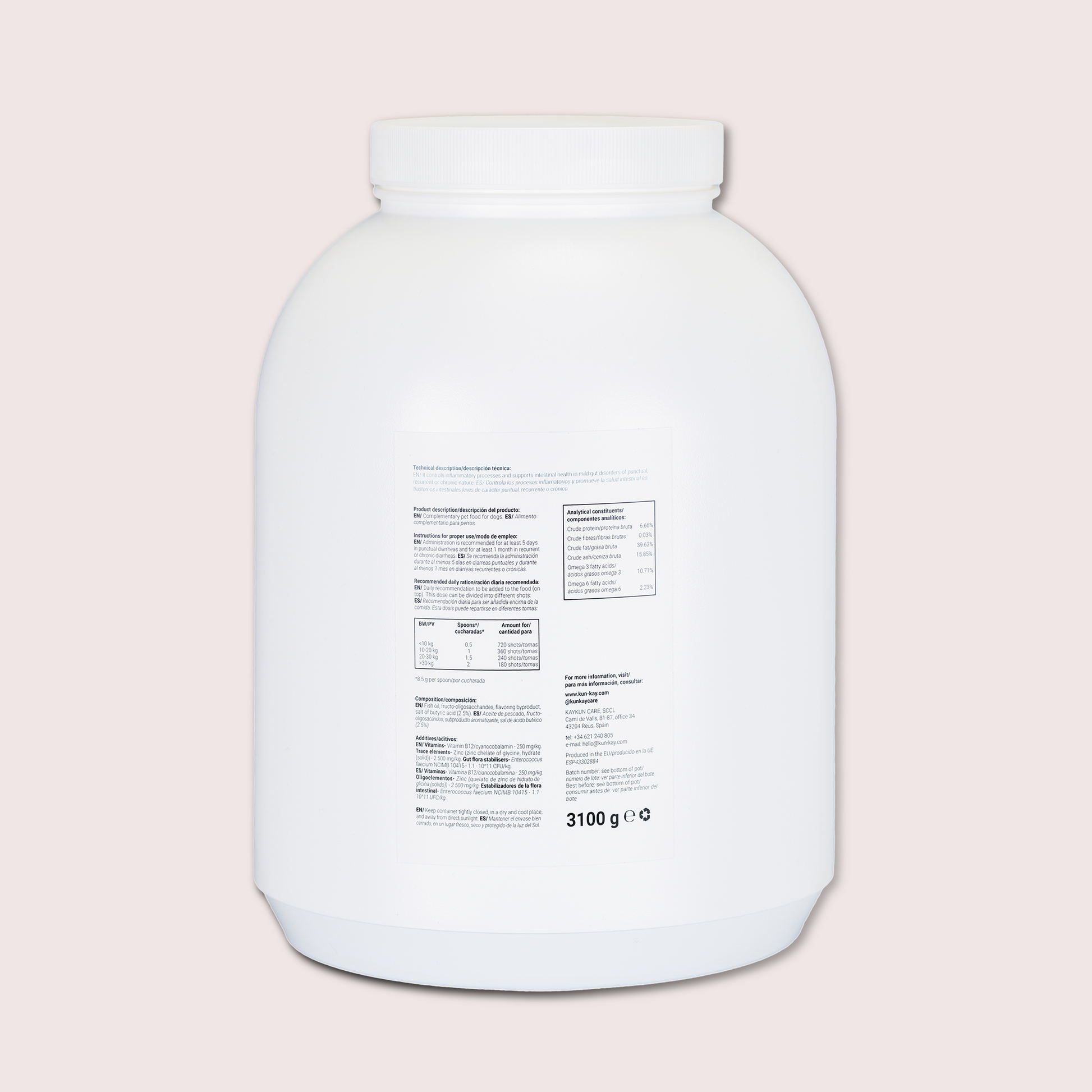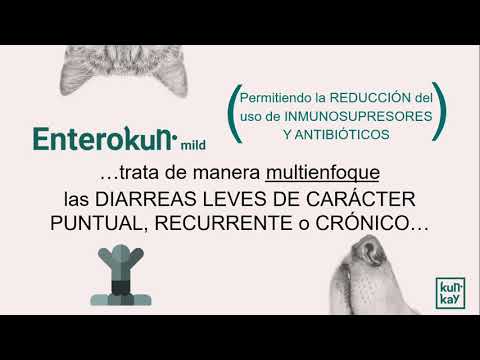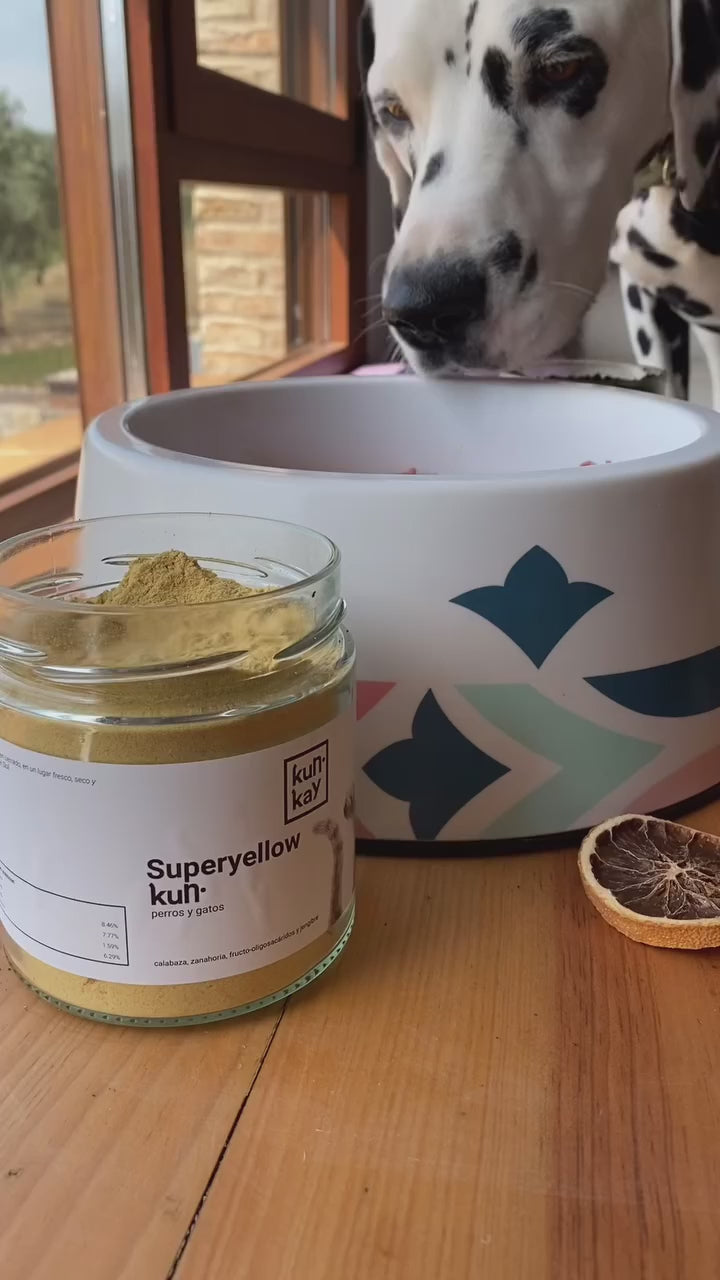Enterokun Mild WOW 3.1 kg
Enterokun Mild WOW 3.1 kg
- Mejora su bienestar digestivo en situaciones leves
- Favorece la restauración del microbioma intestinal
- Protege la mucosa digestiva
- Contribuye a una recuperación rápida y segura de las molestias intestinales
 Natural products
Natural products
 Prioritize the health of your furry family
Prioritize the health of your furry family
 Improve their quality of life
Improve their quality of life
With Enterokun Mild WOW Size 3.1 kg your large dog family or large-sized dog maintains optimal intestinal health, reduces mild recurrent or chronic diarrhea and poor fecal quality, restores the microbiome and intestinal mucosa thanks to its probiotics, prebiotics and anti-inflammatories and is ideal for continuous supplementation.
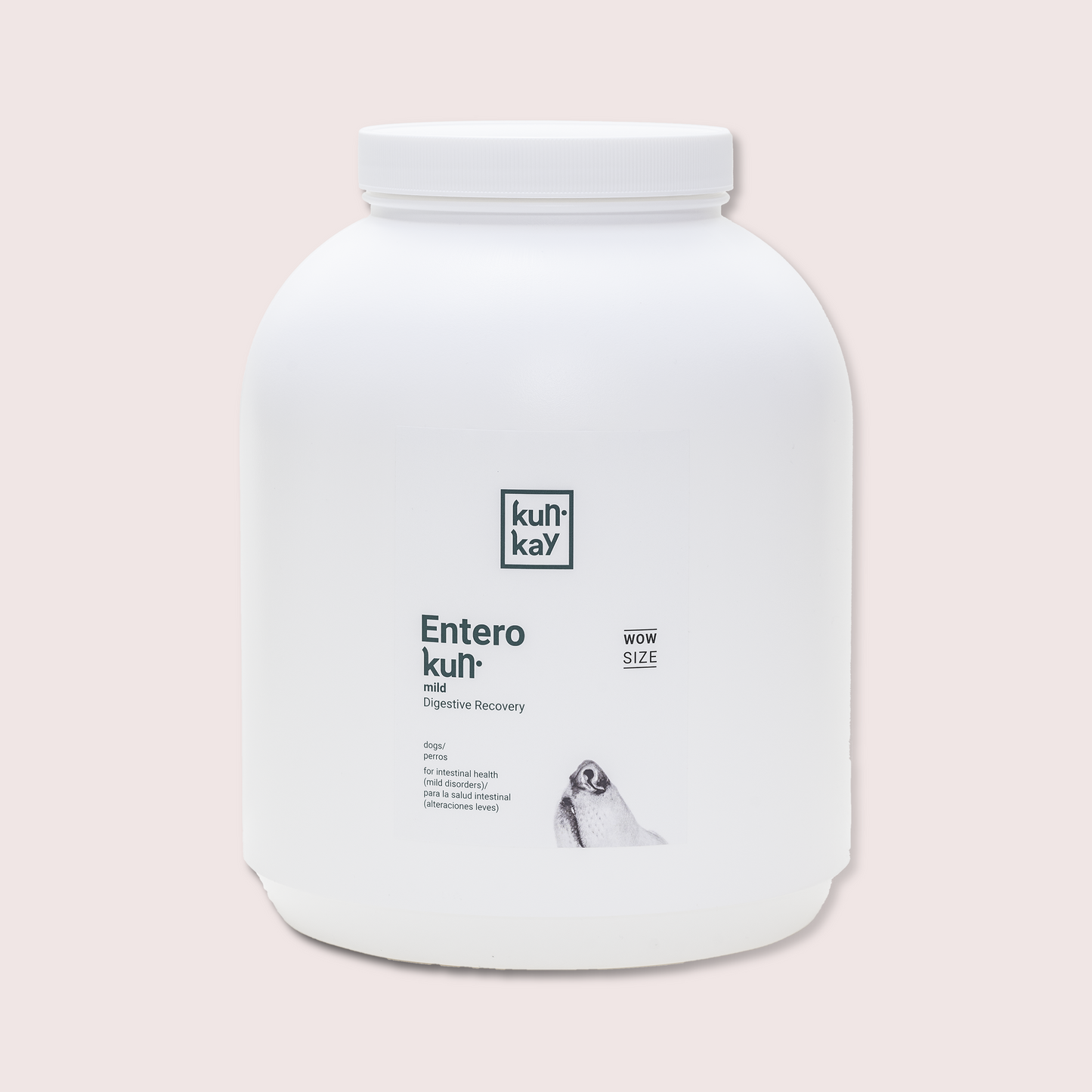
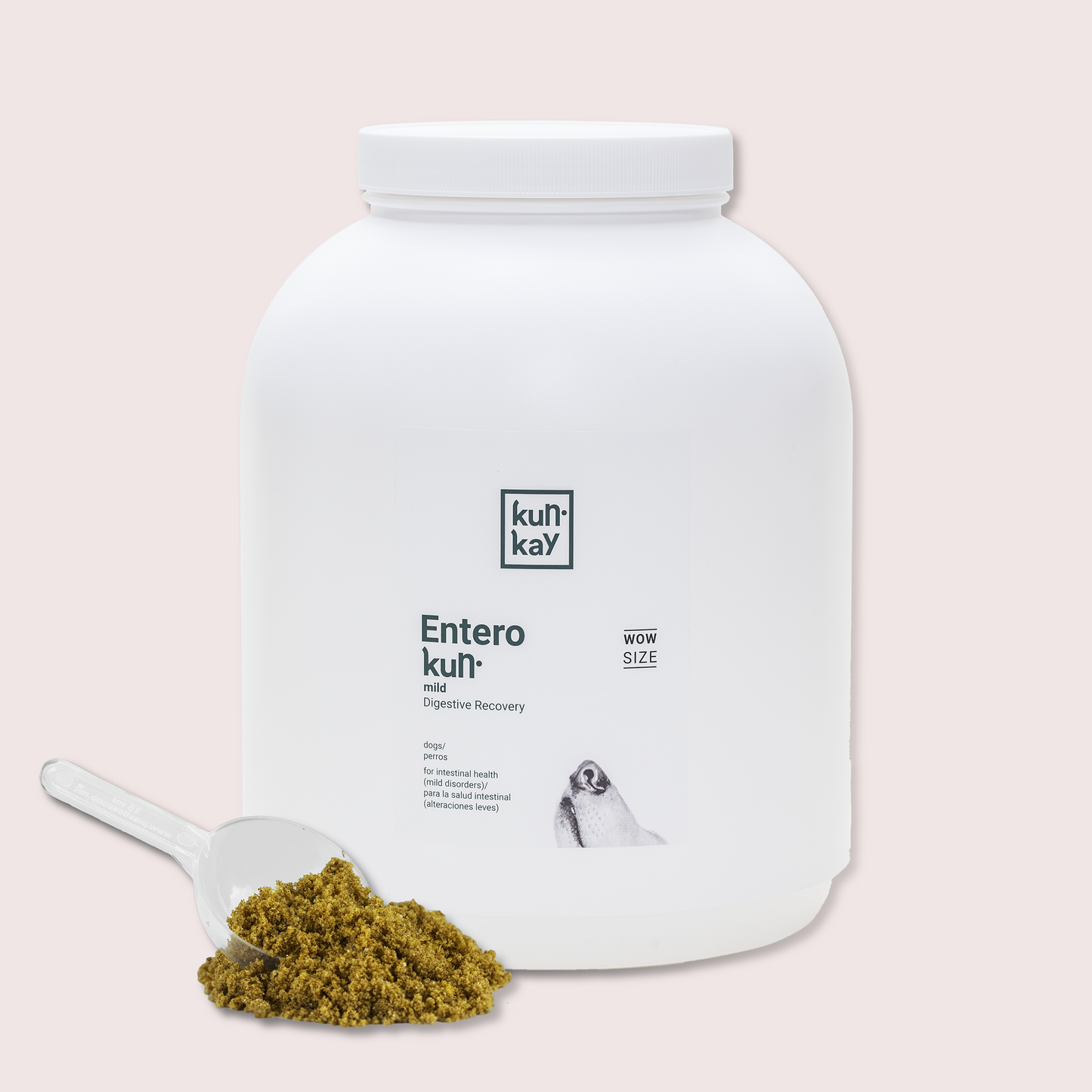
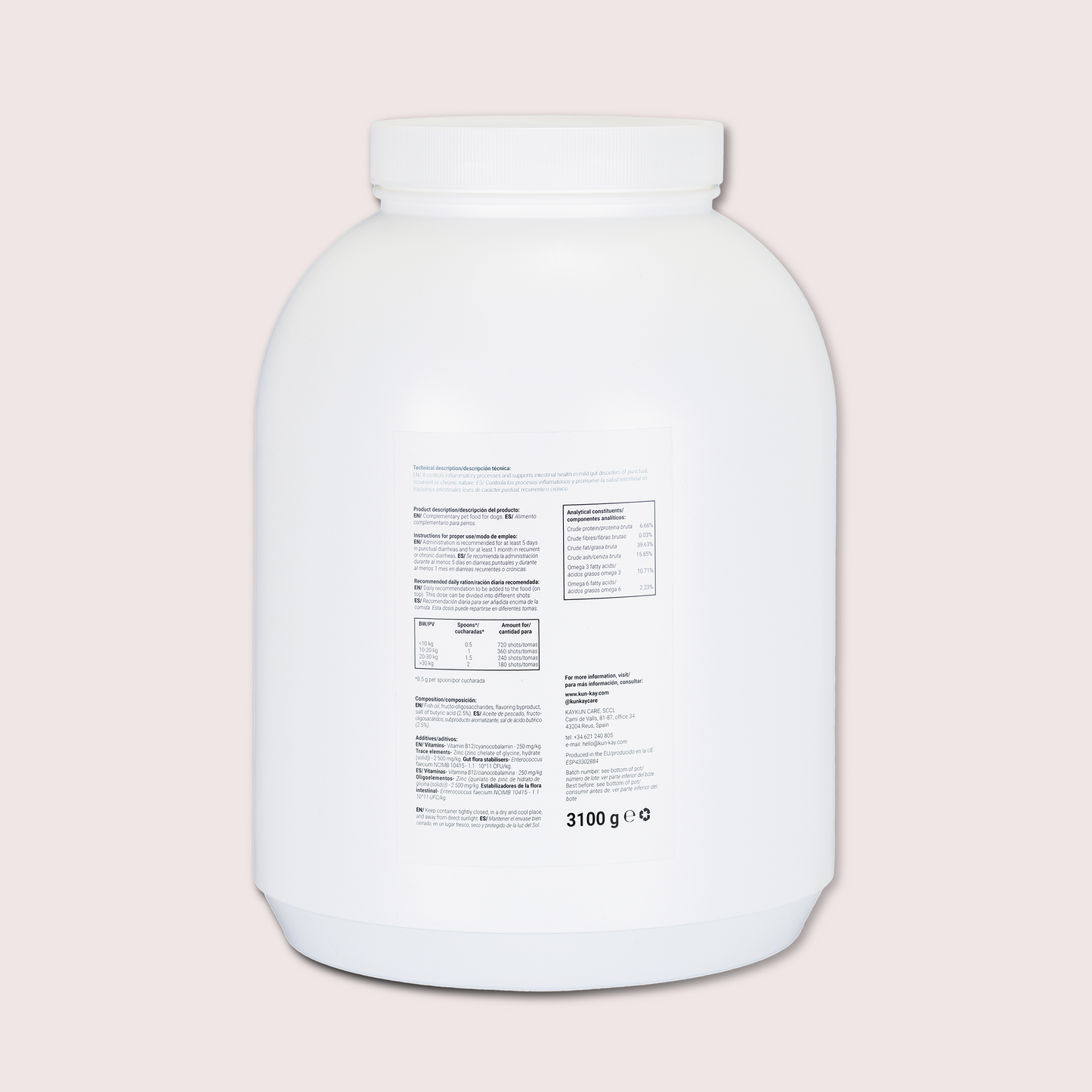
How do we give the shots?
-
From 10 to 20 Kg

1 tablespoon
Shelf life of the package: 1 year -
From 10 to 20 Kg

1.5 tablespoons
Package duration: 9 months -
More than 30 Kg

2 tablespoons
Duration of the container: 6 months
The nutritional supplement Enterokun Mild® keeps your dog's intestinal health in good condition. Now, in WOW Size 3.1 kg format! If your dog is a big guy and you need to supplement with Enterokun Mild continuously, don't hesitate: This is your container!
This is the ideal supplement for large-sized dogs with mild recurrent or chronic diarrhea and poor fecal quality. Thanks to its probiotic, prebiotic, and anti-inflammatory active ingredients, this dietary supplement restores the microbiome and intestinal mucosa, promoting the rapid recovery of your dog's intestinal conditions.
Collapsible content
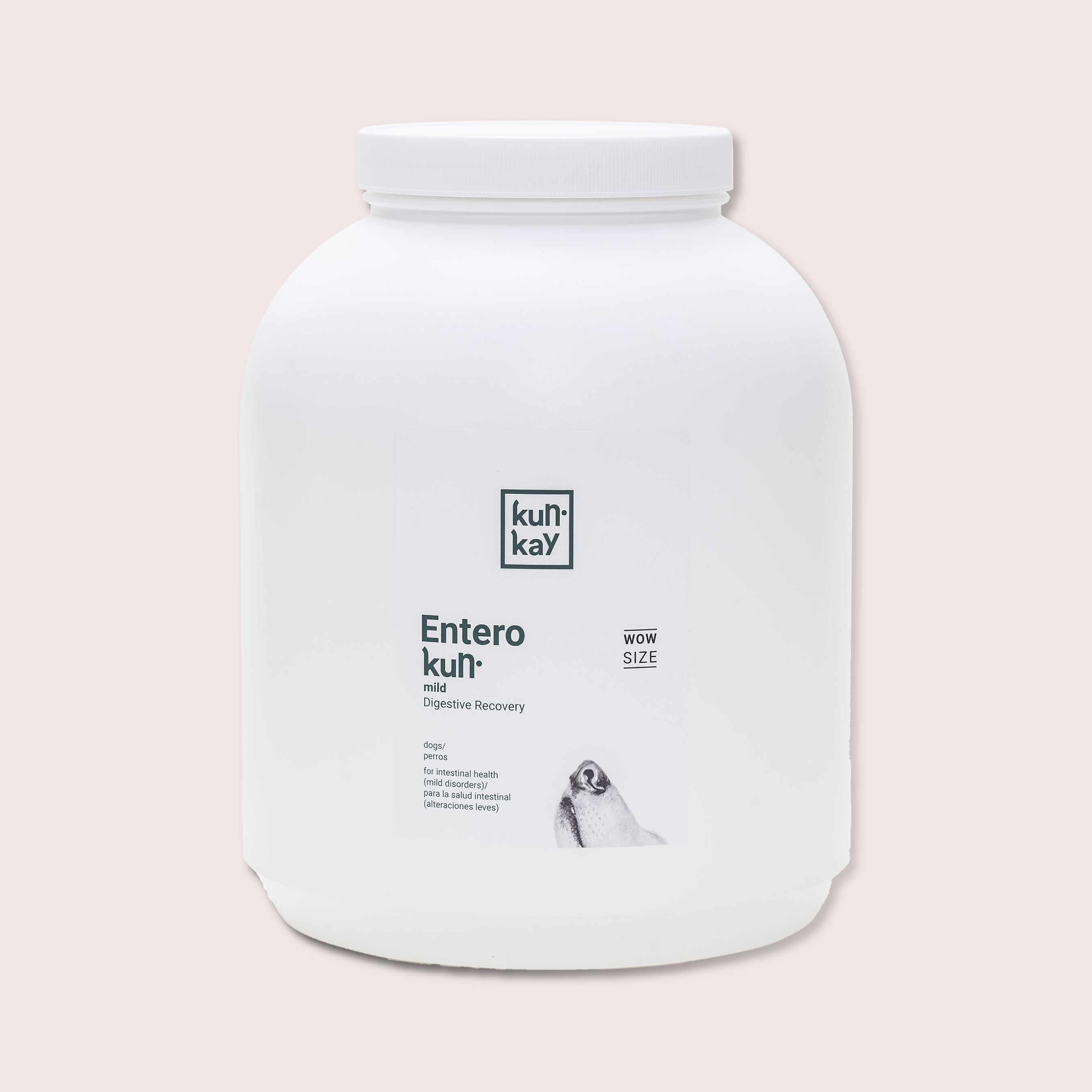
Composition
Ingredients
Nutritional Additives
Analytical Components
To whom and for what purpose?
How is it administered?
Daily recommendation to be added on top of the food. This dose can be divided into different servings throughout the day:
| Weight | Tablespoons* | Container duration |
|---|---|---|
| 10-20 kg | 1.0 | 360 servings = 1 year |
| 20-30 kg | 1.5 | 240 servings = 9 months |
| >30 kg | 2.0 | 180 servings = 6 months |
*11.8 g per tablespoon. The spoon is included in the container.
Enterokun Mild for dogs can be administered together with any type of diet (dry food, homemade cooked or commercial, BARF or dehydrated). Also, it can be administered chronically without the need for any rest period between containers.

Express Shipping

Secure Payments

Customer Service

Excellent quality
How do their active ingredients work?

Butyric acid
It improves epithelial integrity since it is the preferred metabolic fuel of enterocytes, positively influencing cell proliferation, differentiation, and maturation (greater villi height and shallower crypt depth) and therefore facilitates nutrient absorption. Butyric acid also acts by reducing intestinal inflammation, through the reduction of oxidative damage to DNA and by inducing apoptosis in cells with DNA damage.
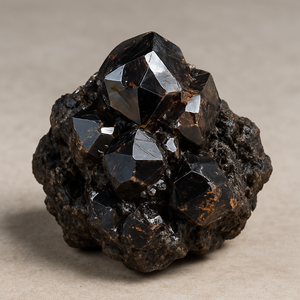
Zinc
Maintains the function and integrity of the intestinal barrier at the level of tight junctions, thus preventing the entry of antigens, toxins, and pathogenic bacteria that cause inflammation.
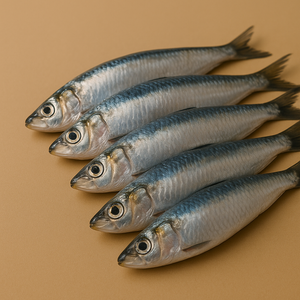
Omega 3 Fatty Acids
They modulate the production of eicosanoids, with the eicosanoids resulting from the metabolism of omega 3 fatty acids being less stimulatory of the inflammatory response than those resulting from omega 6 fatty acids. Additionally, omega 3 fatty acids are precursors of resolvins and protectins, substances that counter-regulate inflammation, serving as agonists of endogenous anti-inflammatory mechanisms and acting significantly in the resolution of inflammation.
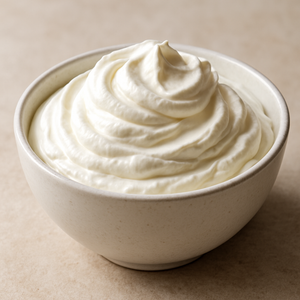
Enterococcus faecium
Improves the balance of the intestinal microbiota. Competition for nutrients, adhesion sites, and the production of antimicrobial substances (short-chain fatty acids, defensins, etc.) inhibit the proliferation of pathogenic bacteria while promoting the development of beneficial bacteria.

Fructooligosaccharides
Prebiotic component, which means it resists digestion and reaches the colon intact where it serves as an energy source for beneficial bacteria (Lactobacillus spp, Bacteroides spp, and Bifidobacterium spp), thus stimulating their growth and/or activity. As a result of its fermentation, the production of toxic substances (ammonia and biogenic amines) decreases and the release of short-chain fatty acids (acetate, propionate, lactate, and butyrate) into the intestinal lumen increases, reducing the presence of pathogenic bacteria (E. coli and C. perfringens), thanks to the reduction of colonic pH.

Vitamin B12
It plays an important role in many biochemical reactions (including DNA synthesis and methionine synthesis from homocysteine), as well as in important enzymatic reactions in the citric acid cycle, where it acts as a cofactor. Hypocobalaminemia typically occurs when specific cobalamin receptors in the ileum are damaged as a consequence of inflammatory disease. Deficiency is accelerated by reduced cobalamin intake and ongoing gastrointestinal losses.
Still have questions?
We answer other tutors' questions
What are its main benefits?
Promotes intestinal health, supports a rapid recovery and helps maintain a balanced microbiome, ensuring your dog's overall well-being.
How and when to administer it?
Daily recommendation to be added on top of the food
This dose can be divided into different intakes throughout the day
Dose according to weight
Dogs 10–20 kg: 1 tablespoon per day, container lasts approximately 360 doses = 1 year
Dogs 20–30 kg: 1.5 tablespoons per day, container lasts approximately 240 doses = 9 months
Dogs >30 kg: 2 tablespoons per day, container lasts approximately 180 doses = 6 months
Each tablespoon equals 11.8 g and the spoon is included in the container
Enterokun Mild for dogs can be administered together with any type of diet (dry food, homemade or commercial food, BARF or dehydrated)
It can be administered chronically, without the need to have any rest period between containers
How long does it take to take effect?
Benefits usually begin to be noticed after 3 days of continuous administration, although the time may vary depending on each pet.
Is it suitable for all ages?
Yes, this product is suitable for dogs of all ages.
Do you have any contraindications?
It is not recommended if you suffer from food allergy to fish or during exclusion diet treatment periods.
Can it be combined with other products?
Yes, it can be administered together with other products or chews. However, it is important to check the possible contraindications of each product before combining them.
Does it have side effects?
Formulated with high-quality ingredients, this product is safe and well tolerated. Always follow the recommended dosage to ensure your pet's safety.
In what formats is it presented?
The product is presented in powder form
What species is it indicated for?
This product is indicated exclusively for dogs
What is the product's shelf life?
Legislation allows a shelf life of one year, so we manufacture small batches to ensure the product arrives as fresh as possible. At the bottom of the package, you will find the batch number and expiration date.
Does it require special storage conditions?
Yes. Keep the container tightly closed, in a cool place protected from direct light. Following these instructions helps preserve all the properties of the product.
Where is it manufactured?
The product is manufactured in Reus, Tarragona, Spain, under quality controls.
What can I give my cat or dog if they have mild diarrhea?
If your dog or cat has mild diarrhea and remains active, without fever or vomiting, you can help restore their intestinal balance with simple and safe measures.
Brief fasting (12-24 h) only in healthy adult dogs (never in puppies or cats). This allows the digestive system to rest.
Fresh water always available to prevent dehydration.
Temporary bland diet, such as pumpkin with shredded boiled chicken (without skin or bones).
Natural digestive supplements like Enterokun Mild or Superyellowkun that help replenish the intestinal flora and improve stool consistency, thanks to their combination of prebiotics (FOS and MOS), probiotics, and postbiotics that promote intestinal balance.
If diarrhea persists for more than 48 hours, there is blood in the stool, or the animal shows apathy or dehydration, it is important to see a veterinarian to rule out infections or parasites.
What care does a puppy need to grow strong?
Good nutrition, vaccines, moderate exercise, and natural supplements with chondroprotectors and omega 3 like Arthrokun, and probiotics like Enterokun Mild to support their development
Aunque el envio tuvo un poco de retraso vale la pena la espera mi perro le fascina los productos y lo mantiene muy saludable
¡Ideal para perros de gran tamaño como mi kangal le ayuda mucho y le encanta el olor y sabor gracias!
En pocos días notamos el resultado! Doy cinco estrellas porqué el precio es alto, pero agradezco mucho la posibilidad de comprar un pack gigante!
Estamos muy contentos, se le ha ido la diarrea que arrastraba desde hacia unos dias


